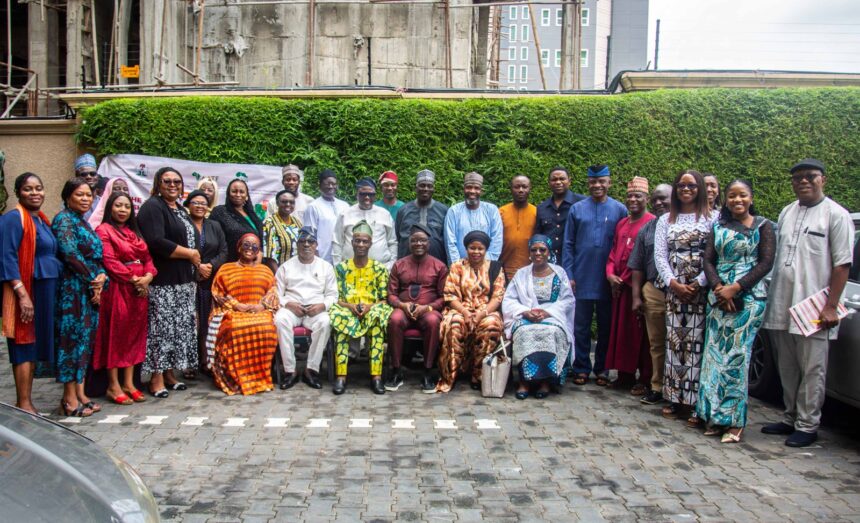Modern biotechnology has been identified as an emerging and crucial tool to secure the Nigeria’s agricultural future, even as the grapples with growing food insecurity, climate challenges, and a rapidly expanding population.
This emerged during a recent sensitization workshop in Abuja where government officials and scientists gathered to explore how Genetically Modified Organisms (GMOs) and agricultural biotech innovations can help Nigeria build a more resilient, nutritious, and sustainable food system.
Modern biotechnology has been identified as a critical tool for securing Nigeria’s agricultural future amid rising food insecurity, worsening climate conditions, and a rapidly growing population. This was the consensus at a recent sensitisation workshop in Abuja, where government officials, scientists, and policymakers gathered to discuss how agricultural biotechnology, including genetic modification organisms can help build a more resilient, nutritious, and sustainable food system in Nigeria.
Director And National Coordinator, Food Safety and Quality Program Food and Drug Services Department at Nigeria’s Ministry Of Health, Mr John Atanda, in a frank attestation to where Nigeria is situated on the adoption of Modern biotechnology, stated that the country currently stands at a critical crossroads, amid the varied interpretations being given Genetic Modification and the products.
In his opening remarks at the Abuja workshop, Atanda said, “Today, we (Nigeria) stand at an important crossroads where various interpretations for and against the use of modern biotechnology have made media rounds and caused some sensational headlines. We believe that by working together, we can transform the way biotechnology is perceived and applied within our nation, ensuring that innovations like genetically modified organisms (GMOS) contribute meaningfully to our food security and nutritional advancement.”
In affirmation of the government’s position on modern biotechnology, he said the country’s Food and Drug Services Department and its Agencies are committed to protecting and promoting public health through safe, nutritious and wholesome foods, to which effect he said, “Every product born from modern biotechnology will be held to the highest safety standards.”
According to Atanda, rigorous risk assessments-covering allergenicity, nutritional composition, long-term health impacts, and environmental considerations will guide Nigeria’s approach toward adoption of modern biotechnology in Nigeria.
In doing so, he said, “We intend to mitigate potential risks and to engender the transparency our consumers rightfully expect,” a feat the country intends to achieve with MDAs like the National Biosafety Management Agency (NBMA), National Agency for Food and Drug Administration and Control (NAFDAC), among others taking the lead.
This was echoed by the Director-General, National Biotechnology Research and Development Agency (NBRDA), Prof. Abdullahi Mustapha, who said that the criticisms surrounding modern biotechnology has not stopped it from producing significant and tangible benefits for Nigerian farmers.
He disclosed that farmers who participated in pilot seasons with TELA Maize reported yield increases exceeding fifty percent, alongside reduced pesticide usage and enhanced net revenues.
“These are not mere theoretical claims; they represent real harvests impacting real families. Cowpea, a staple and cash crop for millions, has likewise seen transformation through pod-borer resistance traits. Field studies and economic evaluations indicate striking returns to farmers cultivating Bt/PBR cowpea: dramatically reducing insecticide sprays, increasing substantial yield protection and very strong returns on investment. For many households, this is translated directly into more food on the table and more money in the pocket.
Let us not forget Bt cotton, which reintroduced a level of yield potential previously unseen in our cotton belt. Trials and early commercialisation demonstrated that Bt cotton can produce yields multiple times higher than the local varieties it replaced, while reducing the pesticide burden on farmers and the environment. That is a win for incomes and a win for safer farming.”
He said these are not isolated anecdotes, stating that the country’s regulatory advancements have moved in parallel with science.
“Nigeria has approved and progressed the commercialisation pathway for insect-resistant and drought-tolerant maize varieties, signalling that we are serious about deploying tools that mitigate pests and climate risks,” Prof Mustapha said.
He said this matter for health and social welfare because health, nutrition and economic resilience are closely bound. “Reduced crop losses mean a more stable food supply, lower food prices and fewer nutrition shocks. Reduced pesticide use lowers public-health risks to rural communities and agricultural workers,” he stated.
Similarly, Dr Rose Gidado, Director, Agricultural Biotechnology at NBRDA, stated in her presentation: that modern biotechnology has become the ‘go-to’ as for Nigeria and other African countries as uncontrolled population growth and climate change continue to exacerbate the challenges of food production in the continent.
She said, Biotechnology, while met with debate, holds immense potential to address the pressing agricultural challenges faced by the continent. Through Agricultural Biotechnology, scientists have been able to enhance crop resilience to pests, diseases, and environmental conditions.”
According to her, by minimizing pesticide application, GM technology can help maintain soil health and protect beneficial insects, crucial for a balanced ecosystem.
She said public skepticism and misinformation about GMOs are still widespread in Africa, partly because of inadequate communication from scientists and policymakers.
To address this, she said it is essential to engage communities, provide transparent information, and involve local stakeholders in decision-making processes.
Dr Gidado disclosed that investing in local research and development, as well as training African scientists in biotechnology, will empower countries to innovate and adapt GM crops to local conditions.
“By supporting fair intellectual property arrangements, reducing seed costs, and promoting seed-sharing systems, African nations can foster equitable access to GM technologies,” she said, concluding that harnessing biotechnology for sustainable agricultural development in Nigeria can enhance food security, improve livelihoods, and drive economic growth.





